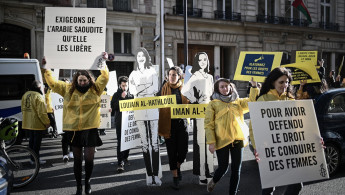Saudi Arabia's leading women activists mark two-year prison anniversary despite kingdom's 'reform drive'
Around May 15, 2018, some of Saudi Arabia's leading women's rights activists, journalists and bloggers were arrested as the kingdom prepared to lift its ban on women driving.
The group included Loujain Al-Hathloul, Eman Al-Nafjan, Nouf Abdulaziz, Hatoon Al-Fassi and Aziza Al-Yousef.
The women's families and human rights groups have long sounded the alarm on the activists' treatment in prison, where they were subjected to solitary confinement, torture (including beatings, electric shocks and waterboarding), sexual harassment and threats of rape and murder.
In March 2019, Saudi authorities launched trials against the women based on a variety of charges linked to their activism. Human rights groups have criticised the processes as "sham trials".
According to Frontline Defenders, the closed-door hearings saw defendants prohibited from speaking during their trials and their lawyers, foreign journalists and diplomats barred from attending.
The women's trial hearings have also been repeatedly postponed, with Covid-19 exacerbating the delays.
Twitter Post
|
To mark the grim anniversary, 17 NGOs - including Amnesty International and the Committee to Protect Journalists - wrote an open letter calling on Saudi authorities to "end their campaign to silence dissent and repress freedom of expression, release all prisoners of conscience, and immediately and unconditionally drop legal charges against [the women's rights activists]."
They also urged the United States government, among others, to press for the women's release and reevaluate their relationship with the kingdom, including their participation in this year's Saudi-led G20 Summit.
With the summit coming up in November, Saudi Arabia has used its chairmanship to ensure women's and human rights would not be discussed.
The move, and arrests of Saudi's leading women activists, underscores the limits of a recent Western-style liberalisation drive led by Saudi Crown Prince Mohammed bin Salman, in a society steeped in conservatism.
“It is heartbreaking that two years have now passed with these brave women still behind bars, especially as during this time Saudi women have been enjoying some of the newfound rights they had fought so hard for,” said Lynn Maalouf, Amnesty International’s Middle East Research Director.
Read also: How Saudi Arabia is using G20 talks to hide its terrible record on women's rights
“In prison, many suffered mental and physical anguish – including torture, sexual abuse and solitary confinement. Scores of others, though released, still face trial based on charges relating to their peaceful activism.
“It is time the Saudi Arabian leadership stopped using the judiciary as a Damocles sword hanging above activists’ heads. Saudi Arabia’s ‘reform drive’ cannot be considered credible as long as these women and other peaceful activists are still being targeted for their work,” Maalouf added.
Follow us on Facebook, Twitter and Instagram to stay connected





 Follow the Middle East's top stories in English at The New Arab on Google News
Follow the Middle East's top stories in English at The New Arab on Google News
![The UAE is widely suspected of arming the RSF militia [Getty]](/sites/default/files/styles/image_330x185/public/2024-11/GettyImages-472529908.jpg?h=69f2b9d0&itok=Yauw3YTG)
![Netanyahu furiously denounced the ICC [Getty]](/sites/default/files/styles/image_330x185/public/2024-11/GettyImages-2169352575.jpg?h=199d8c1f&itok=-vRiruf5)
![Both Hamas and the Palestinian Authority welcomed the ICC arrest warrants [Getty]](/sites/default/files/styles/image_330x185/public/2024-11/GettyImages-2178351173.jpg?h=199d8c1f&itok=TV858iVg)